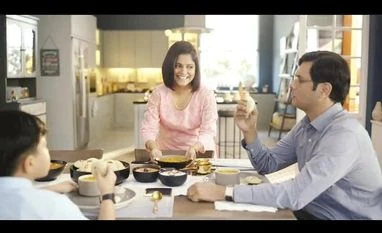The Covid-19 pandemic has brought about a tectonic shift in brand marketing and advertising. Consumer brands, which includes start-ups like Swiggy, BigBasket and Ola, are focusing their messaging on themes like safety, continuity, frugality and positivity as they hope to bank on the Covid-connect.
The health crisis has moved people to their native homes, left thousands out of formal work, and has led to an increase in the time spent on the internet. Brand pundits say that while people have reduced discretionary spending, they have doubled down on items like foods, home repairs, and online education. Families are also looking at making home stays pleasurable through virtual entertainment (on-demands videos, social apps) and focussing on home fitness.
When the pandemic broke out in March, Byju’s was quick on its feet. The company announced that its paid classes will be free for everyone. The move ensured continuity in learning for students, but also raked in new subscribers for the edu-tech platform. In August, Byju’s said 20 million new learners were added.
Cure.fit, too, was quick to pivot. It started online streaming of fitness lessons, extended membership tenure of subscribers, and focused on the food delivery business.
Online cab services were a tad slow to resume, having been given the green light only in May. In June, Ola launched a television and social media commercial. The commercial features a cab driver whose family is apprehensive about his going out to work, but argues that Ola has provided all safety solutions and training and that it safe to ply cabs. “I am also taking care of myself,” the driver says in the TVC. “It is only yesterday, a passenger boarded in hurry but I made sure he boarded only after I fully sanitized the cab. The passenger also liked it.”
Ola provides drivers with masks, sanitizers, and safety curtains. It also shows last recorded temperature of the driver on the passenger app. The temperate check feature is also adopted by Zomato and Swiggy as well.
The integrated campaigns by Zomato and Swiggy have focused not only on safety – they claim to work with restaurants to ensure high standard of hygiene – but also on empathy towards restaurant partners. Zomato put out a TVC that showed a mother allowing her son to order from the platform, tag-lined “because the mother knows the best”; Swiggy, on the other hand, introduced a trove of discounts and offers and a campaign with National Restaurant Association of India (NRAI) as a call to customers to support the foods sector.
With health as a key theme during the pandemic, Zomato is planning to launch a nutrition foods vertical soon. It will be headed by COO Gaurav Gupta, Zomato said on 9 November.
“Every brands uses ‘context’ for marketing,” said Suarabh Varma, former CEO of Publicis Communications and Leo Burnett. “You can pick any brand and put covid against its name and search online, there will definitely something.”
A case in point is Haier, which launched ACs with built-in air purifiers. On the other hand, some outlandish claims in the market – such as Arihant’s anti-corona mattress and Zodiac Clothing’s Covid-19-resistant fabrics – have attracted the ire of advertising watch-dog Advertising Standards Council of India (ASCI). In June, search giant Google, too, cracked down and banned ads with harmful content like "miracle" cures or conspiracies related to Covid-19
Some players have gone beyond just the messaging on safety, and are promoting values of togetherness. “These were exceptional times and we thought what is it that we could do to make the brand more relevant,” Asian Paints CEO and MD Amit Syngle told a TV news channel recently. The paints major launched a campaign called Ghar Ghar to promote happiness and family time at home.
“Home is a place where people gain emotional energy, in terms of being at home and enjoying it. Asian Paints Ghar Ghar stands for this type of connect with emotional space like home,” said Syngle.
In terms of business, advertising dollars have moved online. A recent survey from German market research firm GfK showed that in India over three in four brand marketers (76 percent) have reduced the marketing budgets post Covid-19, shifting advertising budgets towards social media (76 percent) and paid search (64 percent) in the post-pandemic environment.
Brands are also spending more on e-commerce ads, said Varma. “Brands realized that they had to go digital very quickly in the last six months. They had to win e-commerce platforms like Amazon and Flipkart,” said Varma.
Unlock 30+ premium stories daily hand-picked by our editors, across devices on browser and app.
Pick your 5 favourite companies, get a daily email with all news updates on them.
Full access to our intuitive epaper - clip, save, share articles from any device; newspaper archives from 2006.
Preferential invites to Business Standard events.
Curated newsletters on markets, personal finance, policy & politics, start-ups, technology, and more.
)